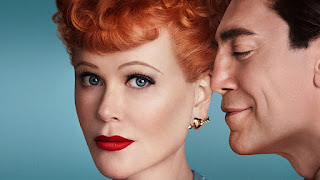Movie Review - Being the Ricardos
Nicole Kidman (The Hours and Moulin Rouge!) stars as Lucille Ball or "Lucy," the comedic actress who played the titular character in I Love Lucy (1951), the most-watched show in the United States and later considered one of the best television programs of all-time. In the fall of 1953, Ball met with an investigator working for the U.S. Congress, as part of the House Un-American Activities Committee (HUAC), which investigated people with Communist ties. This investigation made the news and prompted Ball's husband to address the matter publicly.
Javier Bardem (Dune and No Country for Old Men) co-stars as Desi Arnaz, the Cuban musician and actor who is Lucy's aforementioned husband. He's also the father to her child. He also is the head of the company that produces the show, so he's in charge. Yet, in more ways than one, it's Lucy who wears the pants in the relationship. This perhaps is causing a rift in his marriage and possibly causing him to stray and have affairs. Lucy spends the whole film trying to ascertain if Desi is cheating on her or not.She does so in the week leading up to Desi addressing the public about the Communist investigation. That same week, Lucy and Desi are working on an episode of the I Love Lucy show. Sorkin structures the film in daily segments, as he literally takes us through five days, Monday to Friday, as we watch Lucy and Desi, along with their team put together an episode. This is ground that Sorkin has explored before. Sports Night (1998), Studio 60 on the Sunset Strip (2006) and The Newsroom (2012) were all TV shows that Sorkin created that are about behind-the-scenes looks at people who make TV shows. Behind-the-scenes of TV production is apparently a topic that Sorkin loves.
The majority of the action focuses on a particular joke in the episode that Lucy thinks doesn't work. She spends pretty much the five days trying to fix the joke or change it so that it makes sense to her. She thinks that the joke has a logic problem. It's interesting to see Lucy and the director of the episode battle over deconstructing the joke, but the joke in question is such a minor or lame one that it hardly feels worthy of so much devotion of Sorkin's time. Given the current conversations in mainstream media over so-called "cancel culture," which has been a hot topic, surrounding comedians like Dave Chappelle, I would have preferred if the joke in question had a bit more teeth or sharpness.I was less compelled over that one joke, as I was a conversation between Lucy and one of her writers, Madelyn Pugh, played by Alia Shawkat (Search Party and Arrested Development). That conversation was a deconstruction of the character that Lucy was playing as a whole. It was a conversation that revealed sexism within the show and within the medium in total. It also revealed a generational difference in how older people view comedy, as opposed to younger people.
In addition to the five-day structure, there is also a framing device here where the film utilizes a documentary-like approach. We see the three writers for I Love Lucy, including one who is the executive producer, as elderly people commenting on the events of 1953. It felt like another added layer of artifice that might have been Sorkin's way into this material, but it didn't impress me by the end.Also, in addition to the five-day structure, Sorkin incorporates flashbacks, which reveal the back-story of Lucy and Desi's relationship. We go back about a decade to when they first met while filming Too Many Girls (1940). We see various moments in their past, charting their careers, illuminating the significance of the show to both of them, or specifically its significance to Lucy. It represented her desire to show that she's capable of more than what ageist Hollywood executives think, as well as a way of being closer to her husband, presumptively.
Finally, Sorkin goes into the HUAC controversy, which deemed a lot of people, including those in Hollywood as Communists and thus enemies of the state. Lucy supported the Communist Party USA because it was a labor movement that promoted workers' rights. However, Desi has mixed, if not negative feelings about Communists. Desi is Cuban and in fact was the son of the mayor of Santiago, the second-largest city in Cuba. Desi's grandfather was a very wealthy man and thus his family was very wealthy. Yet, Desi's family lost all that wealth and had to flee to the United States after the Cuban Revolution of 1933. The revolution was aided by Cuban Communists who pushed for workers' rights.We get snippets of Desi's back-story in this regard, and only during one explosive argument do we get Lucy and Desi's difference of opinion on the Communism matter. A whole entire movie, separate from this one, could have been made about their difference of opinion about the Communism matter. It's a difference of opinion that is still relevant to today, if one has been paying attention to the Progressive movement, which was brought to the mainstream during the 2020 Presidential campaign of Senator Bernie Sanders who is a self-described Democratic-Socialist, a term people have compared to Communism. Instead of deconstructing jokes, I wish Sorkin had delved more into this Communist issue.
If you want to see more about the HUAC investigations and how that affected Hollywood, check out Trumbo (2015). If you want to see something really incredible about a Hollywood couple navigating internal and external forces, check out Fosse/Verdon (2019) and if you want to see more about the making of a 1950's sitcom, check out The Dick Van Dyke Show (1961). Sorkin's film here is like a mash-up of all of those but not as indelible.Rated R for nudity, smoking, alcohol, sexual content and foul language.
Running Time: 2 hrs. and 12 mins.
Available on Amazon Prime.
















Comments
Post a Comment